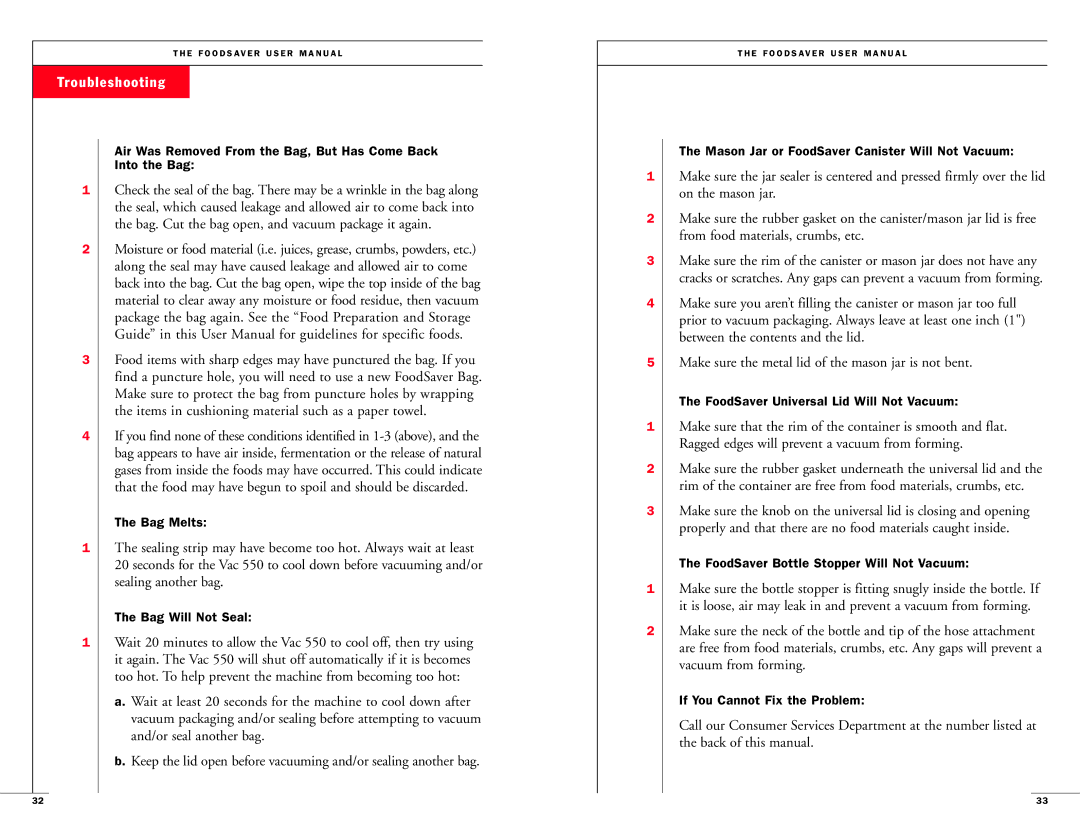
T H E F O O D S AV E R U S E R M A N U A L
Troubleshooting
Air Was Removed From the Bag, But Has Come Back Into the Bag:
1Check the seal of the bag. There may be a wrinkle in the bag along the seal, which caused leakage and allowed air to come back into the bag. Cut the bag open, and vacuum package it again.
2Moisture or food material (i.e. juices, grease, crumbs, powders, etc.) along the seal may have caused leakage and allowed air to come back into the bag. Cut the bag open, wipe the top inside of the bag material to clear away any moisture or food residue, then vacuum package the bag again. See the “Food Preparation and Storage Guide” in this User Manual for guidelines for specific foods.
3Food items with sharp edges may have punctured the bag. If you find a puncture hole, you will need to use a new FoodSaver Bag. Make sure to protect the bag from puncture holes by wrapping the items in cushioning material such as a paper towel.
4If you find none of these conditions identified in
The Bag Melts:
1The sealing strip may have become too hot. Always wait at least 20 seconds for the Vac 550 to cool down before vacuuming and/or sealing another bag.
The Bag Will Not Seal:
1Wait 20 minutes to allow the Vac 550 to cool off, then try using it again. The Vac 550 will shut off automatically if it is becomes too hot. To help prevent the machine from becoming too hot:
a.Wait at least 20 seconds for the machine to cool down after vacuum packaging and/or sealing before attempting to vacuum and/or seal another bag.
b.Keep the lid open before vacuuming and/or sealing another bag.
T H E F O O D S AV E R U S E R M A N U A L
The Mason Jar or FoodSaver Canister Will Not Vacuum:
1Make sure the jar sealer is centered and pressed firmly over the lid on the mason jar.
2Make sure the rubber gasket on the canister/mason jar lid is free from food materials, crumbs, etc.
3Make sure the rim of the canister or mason jar does not have any cracks or scratches. Any gaps can prevent a vacuum from forming.
4Make sure you aren’t filling the canister or mason jar too full prior to vacuum packaging. Always leave at least one inch (1") between the contents and the lid.
5Make sure the metal lid of the mason jar is not bent.
The FoodSaver Universal Lid Will Not Vacuum:
1Make sure that the rim of the container is smooth and flat. Ragged edges will prevent a vacuum from forming.
2Make sure the rubber gasket underneath the universal lid and the rim of the container are free from food materials, crumbs, etc.
3Make sure the knob on the universal lid is closing and opening properly and that there are no food materials caught inside.
The FoodSaver Bottle Stopper Will Not Vacuum:
1Make sure the bottle stopper is fitting snugly inside the bottle. If it is loose, air may leak in and prevent a vacuum from forming.
2Make sure the neck of the bottle and tip of the hose attachment are free from food materials, crumbs, etc. Any gaps will prevent a vacuum from forming.
If You Cannot Fix the Problem:
Call our Consumer Services Department at the number listed at the back of this manual.
32 | 33 |
